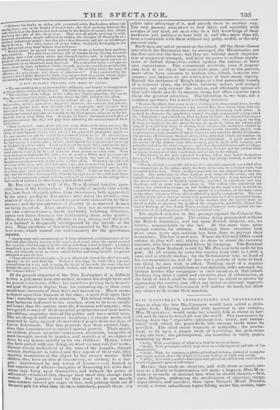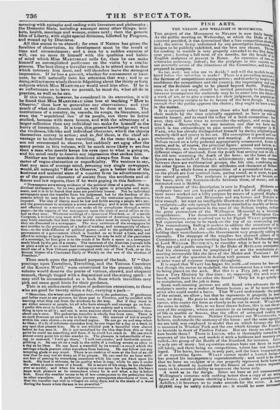MISS MARTINEAU'S INSTRUCTIONS FOR TRAVELLERS.
THIS is what the late Mr. Column' would have called a feelo- sophic book. Having travelled with approval in one country, Miss MARTINEAU would make her country-folk as clever as her- self, and fit them to travel all over the world. She commences by
laying down the " requisites—philosophical, moral, and mecha- nical," with which the goers-forth into strange lands must be provided. The chief moral requisite is sympathy ; the mecha- nical, to fix upon a proper mode of travelling, the pedestrian being the best ; the philosophical, she describes in thirty pages, summing up thus-
" icily, With a certainty of what it is that he wants to know. " 2mdly, With principles which may serve as a rallying-point and test of his observations. "'manly, With, for instance, a philosophical and definite, instead of a popular and vague, notion about the origin of human feelings of right and wrong. " athly, And with a settled conviction that prevalent virtues and vices are the :omit of gigantic genet al influences."
Having thus made an observer, and with about as much suc- cess as a Guide to Conversation will make a linguist, Miss MAI- TINEAU proceeds to instruct him what he should observe,—first, upon Religion, embracing the subdivisions of churches, clergy, superstitions, and suicides; then upon General Moral Notions, nearly a &men subordinate topics falling under this section, cm-
•
silencing with epitaphs and ending with literature and philosophy ; the Domestic State, including amongst many other things, mar- kets, health, marriage and woman, comes next ; then the generic Idea of Liberty, with eight special divisions, followed by Progress, and wound up by Discourse.
All this seems to us absurd ; for even if Nature has given the faculties of observation, its development must be the result of time and circumstances; and a man by a sudden exercise of will, can no more fit himself with the qualities and habits of mind which Miss MARTINEAU calls for, than lie can make himself an accomplished performer on the violin by a similar process. The best thing a traveller carido, is to attend most to that which interests him most, and will therefore leave the strongest impression. If he has a pursuit, whether for amusement or busi- ness, he will naturally turn his attention that way ; and in so doing,will act more wisely than in fidgetting about the thirty or forty subjects which Miss MARTINEAU would send him after. If he is so unfortunate as to have no pursuit, he must do, what all do in practice, as well as he can. If this volume, however, be considered in its execution, it will be found that Miss MARTINEAU aims less at teaching " How to Observe," than how to generalize our observations; and that much of what she directs could as well be done at ciente. The institutions of a country, its records, its songs, its literature, and even the " sepulchral lies" of its people, can there be better studied, because with more leisure, and with the advantage of a larger collection than any individual can make fur himself in the hurry of locomotion. It is true, this general knowledge will want the vividness, life-like and individual character, which the objects themselves convey in action; and to feel these, is the chief ad- vantage to be derived from travelling. At the same time, a per- son not accustomed to observe, but suddenly set agog after the many points in this volume, will be much more likely to see less than a man who merely keeps his eyes open to what is going on, and his mind ready to receive any impression that strikes him. Neither are her mistaken directions always free from the cha- racter of vague abstraction or superficiality. We venture to say, that any man of average mind, perusing any single newspaper. would, all untaught "How to Observe," gain a better idea of the business and material state of a country from its advertisements, or of the general character of society from the accidents and of- fences and law reports, than if he went gaping in this fashion- " Newspapers are a strong evidence of the political ideas of a people. Not in. dividual newspapers; for no two, perhaps, fully agree in principles and senti- ment, and it is to be feared that none are positively honest. Not by individual newspapers must the traveller form his judgment, but by the freedom of dis. euesion which he may find to be permitted, or the restraints upon discussion imposed. The idea of liberty must be low and feeble among a people who per- mit the government to maintain a severe censorship ; and it must be powerful and effectual in a society which can make all it, complaints through a news. paper—be the reports of the newspapers upon the state of social affairs as ills. anal as they may. Whatever reviling. of a tyrannical President, or of a servile Congress, a traveller may meet with in any number of American journal., he may fairly conclude that both the one and the other must be nearly harmless if they are discussed in a newspaper. The very existence of the newspapers lie sees testifies to the prevalence of a habit of reading, and consequently of educa- tion—to the wide diffusion of political power—and to the probable safety and permanence of a government which is founded on so broad a basis, and can afford to indulge so large a licence. Whatever he may be told of the patriotism of a sovereign, let him give it to the winds if he finds a spsce in a newspaper made blank by the pen of a censor. The tameness of the Austrian journals tells as plain stale as if no censor had ever suppressed asyllable; as much so as the small size of a New Orleans paper compared with one of New York, or as the fiercest bluster of a Cincinnati Daily or Weekly on the eve of the election of President."
Thus much upon the professed purpose of the hook. If " Out- pourings upon Travellers, Travelling, and the Various Countries of the Known World." were substituted for the present title, the volume would deserve the praise of various, shrewd, and eloquent remark, though tinged with a dogmatical and theorizing spirit : it may still be recommended as a book from which travellers may pick out some good hints for their guidance.
This is an enthusiastic picture of pedestrian excursions, to those who are good for twenty miles a day, carrying a pack- " Meantime, the wisest and happiest traveller is the pedestrian. If gentlemen and ladies want to see pictures, let them post to Florence, and he satisfied with learning what they can front the windows by the way. But if they want to see either scenery or people, let all who have strength and courage go on foot. I prefer this even to horseback. A horse is an anxiety and a trouble. Some- thing is sure to ail it ; and one is more anxious about its accommodation than about one's own. The pedestrian traveller is wholly free from care. There is no such freeman on earth as lie is for the time. His amount of toil is usually within his own choice—in any civilized region. He can go on and stop when be likes ; if a fit of indolence overtakes him, he can linger for a day or a week in any spot that pleases him. He is not whirled past a beautiful view almost before he has seen it. He is not tantalized by the idea that from this or that point be could we something still finer, if he could bat reach it. He can reach almost every point his wishes wander to. The pleasure is indescribable of say- ing to ones-self, I will go there,' ' I will rest yonder,' and forthwith ACCO■11- plishing ir. He can sit on a rock in the midst of a rushing stream as often in a day as he like,. He can hunt a waterfall by its sound—a mend which the earriaoe-wheels prevent other travellers from hearing. He can follow out any tempting glade in any wood. There is no cushion of moss. at the foot of an old tree that he may not sit down on if he pleases. He can read for an hour with- out fear of passing by something unnoticed while his eyes are fixed upon his book. His food is welcome, be its quality what it may, while he eats it under the alders in some recess of a brook. He is secure of his sleep, be hie chamber ever so sordid; and when his waking eyes rest opon his knapsack, his heart leaps with pleasure as he remembers where be is and what a day is before lint. Even the weather seems to be of less consequence to the pedestrian than to other travellers. A pedestrian journey presupposes abundance of time, so that the traveller can rest to villages on rainy days, and in the shade of a wood during the hours when the sun is too powerful."



























 Previous page
Previous page